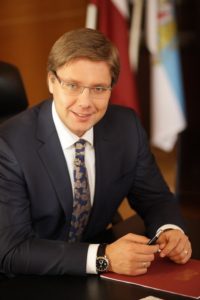Hue
Vietnam
Mayor of Riga, Latvia (December 2014)
Nils Ušakovs

Date of birth: 08.06.1976
Education
2002: Cand.oecon degree (M.Sc. in Anglo-Saxon system) at the Economics Department of the Social Sciences Faculty of the Southern Denmark University. Specialization – European Integration Issues
1999: Bachelor’s Degree in Economics at the Faculty of Economics and Management of the University of Latvia. Specialization – analytical economics (the studies took place within the frames of the Eirofakultāte (Euro faculty) program)
Work Experience
20 st June, 2013: Re-elected to the post of the Chairman of Riga City Council
1st July, 2009: Elected to the post of the Chairman of Riga City Council
October, 2006: Elected to the 9th Saeima (Parliament of Latvia).
2005: Entered the National Harmony Party. In November 2005 he was unanimously elected to the post of the Chairman of the Political Union «Harmony Centre». On 27th November Nils Ušakovs was repeatedly elected to the post of the Chairman of the Board of the Political Union «Harmony Centre» for two years. He is a naturalised citizen of Latvia.
2004: Received the Ciceron Award established by the Latvian Union of Journalists and the University of Latvia for the input in journalism. He was a Member of the Board of the public organisation «Baltic Forum»
From January, 2005: Editor of the evening news for Lithuania and Estonia.
March, 2004 –November, 2005: Editor of the News Service of the First Baltic Channel, prepared news releases of Lithuania, Latvia and Estonia
2001-2004: Host and Editor of the weekly program «Nedēļas tēma» (Theme of the week), television channel TV5.
Till July 2002: Editor, News and Politics Department, newspaper «Teļegraf»
April 2000 -September 2001: Editor, News and Politics Department, newspaper «Respubļika»;
1999 – 2000: Correspondent of LTV News, Latvian Public Television
1998 -1999: Producer, Baltic Division of the Russian TV channel NTV
Languages: Russian — native, Latvian and English — fluent, German and Danish — basic, Swedish — learning.
Hobbies: sports — running and cycling.
1) The Historic Centre of Riga was registered on the World Heritage List in 1997. What has been the impact of this nomination for your city?
Since the historic centre of Riga was enlisted into the World Heritage List development of this part of the city has gained a new dimension where historic and culture heritage values prevail: public exterior, important city building ensembles, green territories’ system as well as individual buildings and objects of culture and historic heritage significance.
A special and constantly updated legislative basis has been created for this part of the City. The main values forming the culture and historic heritage environment are pointed there as well as their preservation, transformation and development possibilities.
2) In your opinion, what is the vital role of a mayor when a site has been inscribed on UNESCO’s World Heritage List?
Positive understanding on the necessity to join the UNESCO World Heritage Cities community, direct interest in the ongoing process development, moral support and management of the Municipality institutions to secure finance and preparation of the application documents.
Focused activities are essential to promote the preparation of the territory development plan and construction regulations, stimulation of the tax incentives policy to encourage maintenance and preservation of the historic buildings.
3) Concretely, what have been your actions toward the protection and enhancement of your heritage? What has been your personal role in the protection and enhancement of your heritage?
In leading the Riga Municipality preservation of cultural and historic heritage and development including renovation and restoration of particular objects in the city are issues that fall under my supervision. I have ensured implementation of the legislative basis to promote balanced city development while preserving the historic heritage.
4) Do you organise special events to enhance your city?
I could name a number of the city amelioration and territory regeneration activities like Spīkeri complex and the Daugava river embankment reconstruction and recreation zone development in Lucavsala island situated in the UNESCO preservation zone.
Application of tax reductions for appropriate maintenance of buildings in accordance with requirements of the culture and historic heritage is an efficient instrument for preservation of the heritage.
5) Riga has an undeniable regional influence and stature that particularly motivates a strong tourism from neighbour countries of Northern Europe. Have you developed or do you plan to develop a touristic offer addressed to a more international-like clientele?
Our city has always been open to guests from all over the world. Majority of Riga residents are multi-lingual, about one third speak at least three languages providing tourists feel at ease here.
Riga has direct flights to more than 30 destinations in Europe providing good connections to other continents via the largest hubs. The city has a very good cooperation with the tourism industry for attraction of tourists and international events to Riga.
6) In your opinion, what makes Riga such a special place?
Number one is definitely the location of Riga – it has always been the capital of a country between the Western and Eastern cultures, situated on one or another side of the border at different times. Since the foundation of the city 800 years ago until now Riga has been an important centre of trade.
All the periods of rule are reflected in the city’s architecture: Livonian State – Medieval part of the city; period of the Swedish Kingdom – remains of the fortification constructions; Russian Empire rule – industrial buildings and expansion of the railway and port structure; national romanticism, eclectic and finally the unique Art Nouveau style architecture. There is also a significant amount of wooden architecture examples preserved since the 19th century.
Riga is a business and meeting place, its favourable geographical location has always encouraged to place there the chairs of administration, military or religious institutions of Latvia, it is an important centre of culture and art, a popular destination for tourists.
News
Together towards the New Urban Project
Technical Assistance and Cooperation
Youth and citizens
Communication


